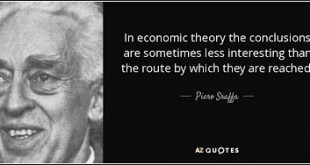Slow posting will continue the rest of the Summer. Here a paper by Sergio Cesaratto that might be of interest. From the abstract: The paper is a contribution to a long-run theory of effective demand with elements from monetary circuit theory, Modern Monetary Theory and endogenous finance analysis. Some shortcomings of the still influential neo-Kaleckian growth model and monetary circuit theory are underlined, and the Sraffian supermultiplier is indicated as the most promising heterodox...
Read More »The theory of endogenous money and the LM schedule
By Tom Palley. From the abstract: Money is at the center of macroeconomics, which makes understanding the money supply central for macroeconomic theory. this paper presents the Post Keynesian theory of endogenous money supply and shows how it is fundamentally different from the conventional money supply theory. the conventional approach relies on the money multiplier and bank lending is invisible. Post Keynesian theory discards the money multiplier and focuses on bank lending which drives...
Read More »Kalecki’s Fable
By Jan Toporowski (Full paper published by ROKE here)Following the death, in 1935, of the Polish military dictator Józef Piłsudski, his regime continued under a group of his military cronies, known as the ‘colonels’, who increasingly modeled their regime on that of Mussolini in Italy. One of the colonels, who was responsible for economic development, wanted to understand the economic principles behind government stabilization. He called in Kalecki's colleague from the Institute for the Study...
Read More »A Brief Sketch of the Classical-Keynesian Perspective
By David Fields, originally posted hereFrom a Classical-Keynesian perspective (Bortis, 1997, 2003), rates of interest regulate rates of profits (Panico, 1980, 1985), and, thus, real wages are endogenously determined. The presence of financial instruments, which represent titles to future flows of income, makes it so that the actual center of distributive conflict in capitalism lies not in the technical conditions of production, but is rather governed by the real rate of interest, which is...
Read More »Steve Keen on Loanable Funds and Endogenous Money
Steve Keen gives a lecture below on the macroeconomics of loanable funds and endogenous money using his program Minsky.[embedded content]
Read More » Heterodox
Heterodox

